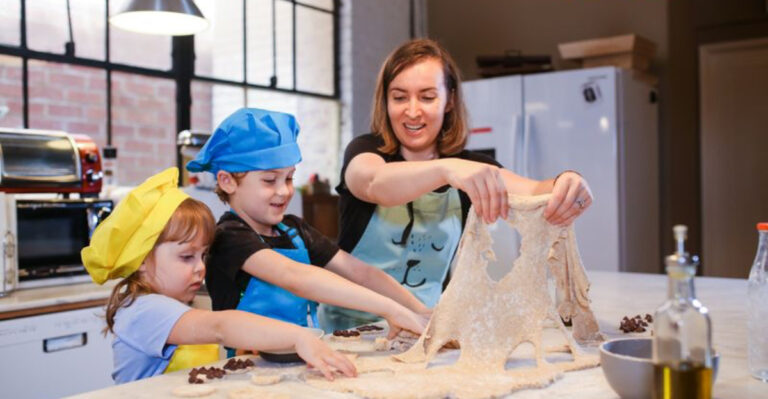Parents Who Have The Closest Relationships With Their Adult Kids Always Do These 32 Things Early On
Building a strong relationship with your kids from an early age can lead to lifelong bonds that grow even stronger as they reach adulthood.
These parents have cracked the code, and here are the 32 things they do early on to maintain these close relationships.
From listening with intent to creating lasting memories, each of these points highlights the subtle yet impactful ways parents can nurture a connection with their children that stands the test of time.
1. Listen Like They’re The Most Interesting Person In The World

Who doesn’t love a good story? Especially when it’s told by someone who sees the world with fresh eyes. Parents who have close relationships with their adult kids often start by listening—truly listening. They put down their phones, make eye contact, and absorb every word as if they’re hearing a riveting tale of adventure. This act of listening, of giving undivided attention, creates a foundation of trust and respect.
When a child feels heard, they feel valued. This isn’t just about humor or anecdotes; it’s about understanding their fears, dreams, and quirks. The stories shared over dinner, during car rides, or at bedtime are not just tales; they’re building blocks of empathy and connection.
By offering a safe space where kids can express themselves without judgment, parents nurture their child’s confidence. As life gets busier, this simple act of listening becomes a cherished memory, a reminder that “my parents always made time for me.” It’s a timeless gift that keeps the conversation flowing throughout the years.
2. Celebrate The Little Wins

Every little victory deserves a party. Whether it’s the first time they tie their shoes or the moment they score a goal in soccer, these small celebrations create big impacts. Parents who cherish close ties with their grown-up children remember the importance of cheering for the little things.
Acknowledging small achievements sends a powerful message: “I see you, and I’m proud of you.” It’s not about grand gestures but about the simple act of recognizing efforts and growth. These celebrations become stories that kids reminisce about, filled with laughter and joy.
The balloons may deflate and cakes get eaten, but the happiness of being acknowledged stays forever. It teaches children that every step, no matter how small, is worth celebrating. This mindset fosters positivity and resilience, helping kids navigate life’s ups and downs knowing their parents are their biggest fans.
3. Cook Together, Laugh Together

There’s something magical about the aroma of a home-cooked meal, especially when it’s created together. Parents who have lasting bonds with their adult kids often share kitchen duties, turning meal prep into an opportunity for connection. Whether it’s chopping veggies or kneading dough, cooking together becomes a delightful dance of collaboration and creativity.
Laughter is the secret ingredient in these culinary adventures. From playful banter about who makes the better sauce to sneaky taste tests, these moments become the flavor of cherished memories. The kitchen transforms into a stage where everyone can be themselves, where mistakes are just part of the recipe.
Through shared culinary experiences, parents and kids build traditions that can last a lifetime. The skills learned and the laughter shared become the spices that enrich their relationship. Years later, the scent of a particular dish might bring back a flood of joyful memories. It’s about creating something delicious together, both in the dish and in the bond.
4. Be Their First Travel Partner

Traveling opens up worlds, and doing it with your parents by your side makes it an unforgettable journey. Parents who enjoy close relationships with their adult children often embark on travel adventures together from a young age. Whether it’s a weekend road trip or a cultural escape to another country, these journeys plant seeds of curiosity and wonder.
Traveling together means sharing experiences that go beyond everyday routines. It’s the laughter over a map, the shared discovery of a hidden gem, and the bonding over local cuisine. Traveling challenges and rewards, offering new perspectives and a shared history.
These adventures create a tapestry of stories that enrich the parent-child bond. They teach adaptability, understanding, and appreciation for diverse cultures. As kids grow, these travel memories become guiding stars, reminding them of the places and experiences shared with their first travel partners.
5. Encourage A Curiosity For Books

Books are portals to other worlds, and parents who have close ties with their adult kids often kindle a love for reading early on. They create cozy reading nooks and share stories that ignite imagination and curiosity. Reading becomes a shared adventure, where each page turn brings new discoveries and discussions.
A love for books nurtures a child’s ability to think critically and empathize with different perspectives. Parents who read with their kids open doors to conversations about characters, plots, and the world beyond. It’s not just about the stories but about the shared experience of exploring together.
These reading rituals create lasting bonds and become cherished traditions. Years later, a particular book might bring back memories of snuggles and shared whispers. Encouraging a love for books is a gift that lasts a lifetime, creating a foundation for continuous learning and connection.
6. Create Traditions That Matter

Traditions are the threads that weave families together, and parents who foster lasting connections with their adult kids often create their own unique traditions. Whether it’s a weekly game night or a holiday cookie-baking marathon, these rituals become the highlights of family life.
Traditions give families something to look forward to, a time to come together and celebrate. They’re the stories passed down through generations, creating a sense of belonging and continuity. Even as life changes, these rituals remain a constant, a comforting reminder of home.
By involving kids in the creation of family traditions, parents give them a sense of ownership and pride. These traditions become the cherished memories that kids carry into adulthood, the stories they’ll share with their own families one day.
7. Teach Them To Be Kind
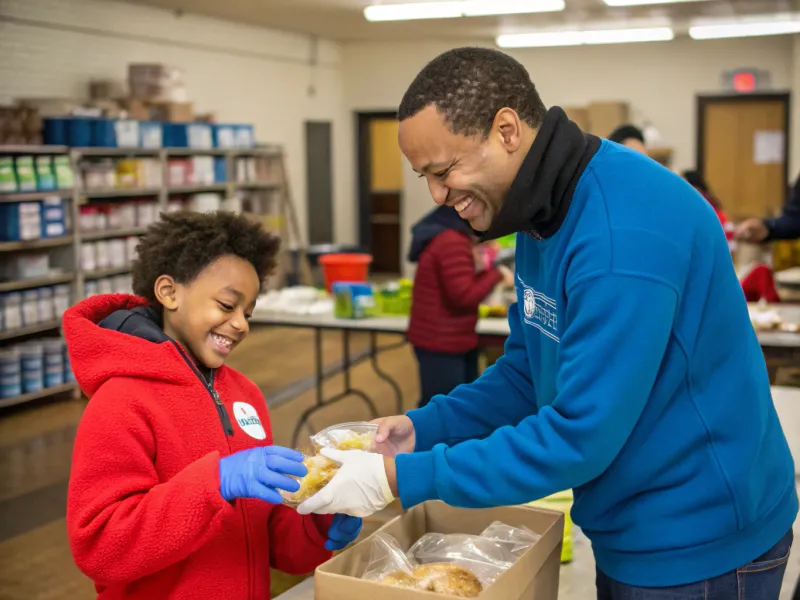
Kindness is a language everyone understands. Parents who maintain close bonds with their adult children often teach the importance of kindness from an early age. They show through actions, volunteering together or helping a neighbor in need, that kindness is a powerful force for good.
Teaching kindness is about instilling empathy and compassion. It’s about understanding others and offering a helping hand. These lessons teach kids to see the world through an empathetic lens, valuing people and their stories.
As kids grow, the acts of kindness they learned from their parents become part of who they are. These lessons in compassion create a ripple effect, influencing how they interact with the world and the relationships they build. Kindness becomes a shared value that strengthens their bond with their parents.
8. Laugh Through The Tough Times
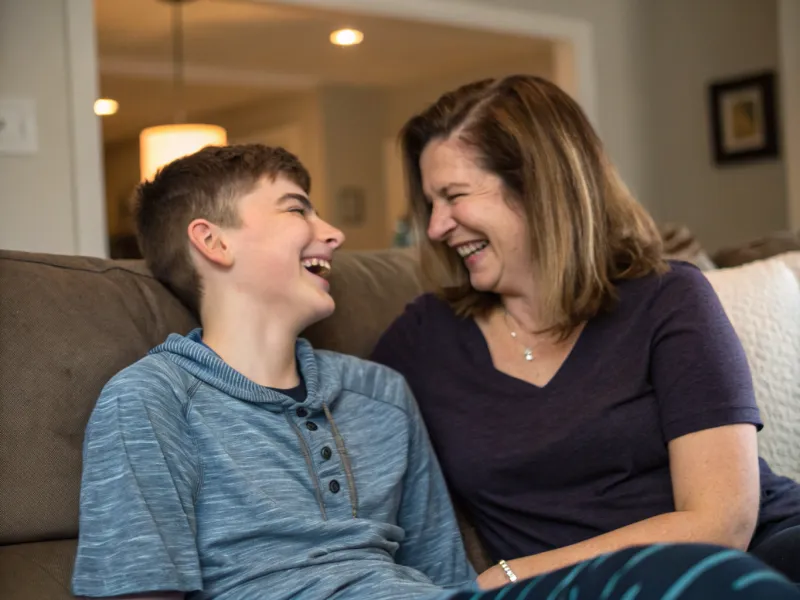
Life’s storms can be daunting, but laughter is the umbrella that keeps us dry. Parents who enjoy close relationships with their adult kids often navigate tough times with humor. They teach that laughter is a powerful tool to lighten heavy moments and bring perspective.
Shared laughter during challenges creates a bond of resilience. It reminds kids that even in difficult times, there can be joy. Whether it’s a flat tire on a rainy day or a burned dinner, these moments become stories filled with humor and love.
Years later, these memories of shared laughter become cherished tales. They remind adult kids of their parents’ ability to find light in the darkest times, teaching them to approach life’s challenges with a smile.
9. Support Their Passions

Every child has a spark, and parents who maintain close relationships with their adult kids fan those flames by supporting their passions. Whether it’s music, sports, art, or science, they encourage exploration and expression.
Supporting a child’s passion means being their biggest cheerleader. It’s attending recitals, cheering at games, and displaying artwork on the fridge. These acts of support build confidence and self-worth.
By valuing their child’s interests, parents show that they believe in their potential. As kids grow, these passions evolve, but the foundation of support remains. Parents who nurture their child’s dreams create a legacy of encouragement and love that lasts a lifetime.
10. Share The Magic Of Nature

Nature is the ultimate playground, and parents who have close relationships with their adult kids often share the wonders of the great outdoors. From hiking in forests to star-gazing in the backyard, these experiences create a sense of wonder and connection.
Exploring nature together fosters curiosity and appreciation for the world around us. It’s about smelling the fresh earth, feeling the breeze, and listening to the rustle of leaves. These sensory experiences become the backdrop of cherished memories.
The love for nature nurtured by parents becomes a lifelong passion for kids. It teaches them to respect and protect the environment, forging a bond with nature and their parents that transcends generations.
11. Teach The Art Of Conversation

Some of the best relationships are built on words shared over coffee or during walks. Parents who have strong relationships with their adult kids teach the art of conversation from an early age. They engage in meaningful discussions, listening and responding with empathy.
Good conversation is more than just talking; it’s about connecting. It’s about understanding perspectives, sharing ideas, and sometimes agreeing to disagree. These interactions teach kids to express themselves with clarity and confidence.
As kids grow, the conversations become deeper and more nuanced. The ability to communicate openly and honestly becomes a pillar of their relationship, helping them navigate life’s complexities together. It’s a skill that enriches their bond and brings them closer over time.
12. Foster A Sense Of Humor

Laughter can turn any moment into magic, and parents who have close ties with their adult kids often share a well-developed sense of humor. From silly jokes to shared giggles over a comedy show, humor becomes a language that connects.
A shared sense of humor helps kids see the lighter side of life. It teaches them that laughter can diffuse tension and bring people closer. These humorous interactions become the glue that holds their relationship together.
As kids grow, the jokes may evolve, but the laughter remains. It becomes a cherished part of their shared history, a reminder that laughter can conquer even the toughest days. Humor becomes the shared thread in their tapestry of memories.
13. Instill A Love For Music

Music is a universal language, and parents who have close relationships with their adult kids often share a love for music. Whether it’s singing along to favorite tunes or learning an instrument together, music becomes a shared passion.
Music has the power to evoke emotion and create lasting memories. It’s about the moments spent singing off-key on road trips or dancing in the living room. These shared musical experiences strengthen the bond between parents and kids.
As kids grow, music becomes a way to express themselves and connect with others. The love for music nurtured by their parents becomes a lifelong passion that continues to bring them joy and connection.
14. Value Quality Time Over Quantity

In a world that often prioritizes busyness, parents who enjoy close relationships with their adult kids understand the power of quality time. It’s not about the hours spent together but the moments that matter.
Quality time means being present, whether it’s a quiet afternoon of fishing or a shared meal. It’s about creating memories that last a lifetime. These moments become the stories that kids carry with them, tales of connection and understanding.
As kids grow, the value of quality time becomes even more apparent. It’s about making the most of every moment, prioritizing connection over distraction. Parents who value quality time teach their kids the importance of being present and cherishing the people they love.
15. Teach Them To Be Resilient
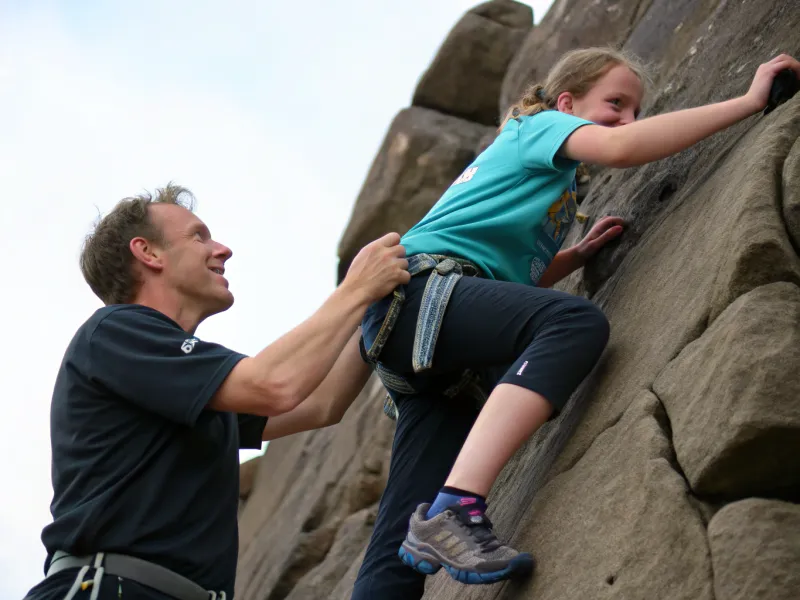
Resilience is a gift that lasts a lifetime, and parents who have strong relationships with their adult kids often teach this skill from an early age. Whether it’s overcoming a fear or facing a setback, they encourage their kids to persevere.
Teaching resilience is about showing kids that failure is not the end but a stepping stone to growth. It’s about encouraging them to try again, to learn from mistakes, and to keep going despite challenges.
As kids grow, the lessons of resilience become part of who they are. They learn to face life’s ups and downs with courage and determination, knowing their parents are always there to support them. This shared value of resilience strengthens their bond and prepares them for the future.
16. Show Unconditional Love

Unconditional love is the foundation of a strong parent-child relationship. Parents who have close relationships with their adult kids show this love in countless ways, creating a safe and nurturing environment.
Unconditional love means accepting kids for who they are, faults and all. It’s about supporting their choices and being there through thick and thin. This love teaches kids that they are valued and cherished, no matter what.
As kids grow, the lessons of unconditional love become the bedrock of their self-worth. It gives them the confidence to be themselves and face the world with courage. Parents who show unconditional love create a bond that lasts a lifetime, built on trust, respect, and understanding.
17. Encourage Independence

Encouraging independence is a delicate balance, and parents who have strong relationships with their adult kids often master this art. It’s about guiding them while giving them the freedom to explore and grow.
Teaching independence means trusting kids to make their own decisions and learn from their experiences. It’s about celebrating their milestones, like their first solo road trip, with pride and encouragement.
As kids grow, the lessons of independence become a source of confidence and self-reliance. They learn to navigate the world with the knowledge that their parents are always there to support them, creating a bond of trust and respect that lasts a lifetime.
18. Teach Them To Give Back
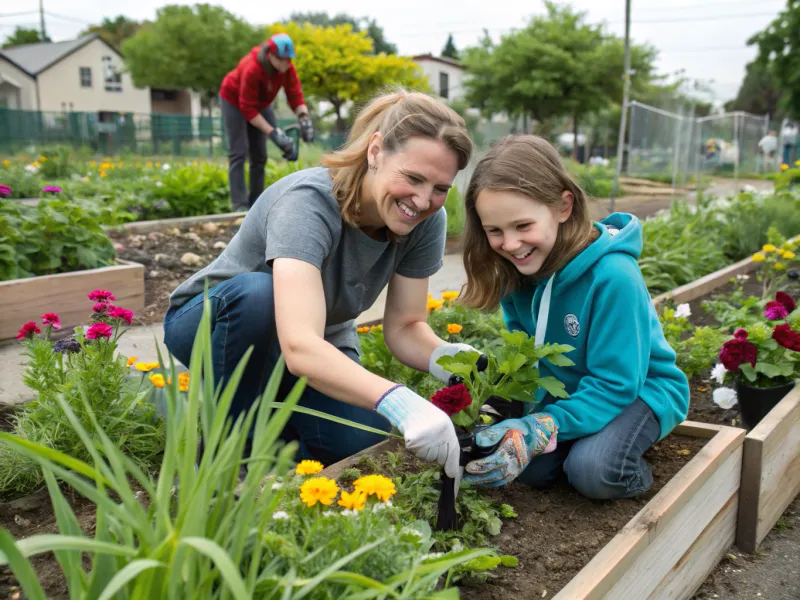
Giving back is a lesson in empathy and compassion, and parents who have close relationships with their adult kids often teach this value early on. They volunteer together, showing that helping others is a rewarding and meaningful experience.
Teaching kids to give back creates a sense of responsibility and community. It shows them the impact they can have on the world and the importance of contributing to something greater than themselves.
As kids grow, the lessons of giving back become a core part of their values. They learn to see the world through a lens of generosity and kindness, strengthening their bond with their parents through shared experiences of helping and caring for others.
19. Foster Creativity And Imagination

Creativity is the spark of innovation, and parents who have close relationships with their adult kids often nurture this spark from an early age. Whether it’s through art, music, or imaginative play, they encourage creative expression.
Fostering creativity means providing opportunities for kids to explore and express themselves. It’s about embracing their ideas and supporting their creative endeavors, no matter how unconventional.
They learn to think outside the box and approach life with an open mind. Parents who foster creativity create a legacy of innovation and exploration, enriching their bond with their kids.
20. Embrace Their Individuality

Individuality is a celebration of self, and parents who have close relationships with their adult kids often embrace their uniqueness. They encourage kids to express themselves and explore their identity without judgment.
Embracing individuality means valuing differences and celebrating what makes each person unique. It’s about supporting their choices and being proud of who they are.
They learn to embrace their differences and stand tall, knowing their parents are always there to support them. This celebration of individuality strengthens their bond, creating a relationship built on love and acceptance.
21. Teach Financial Responsibility

Financial responsibility is a vital life skill, and parents who have close relationships with their adult kids often teach this from an early age. They involve their kids in budgeting, saving, and making wise financial decisions.
Teaching financial responsibility means providing guidance and support as kids learn to manage their money. It’s about showing them how to set financial goals and make informed choices. This shared understanding creates a bond of trust and respect that lasts a lifetime.
22. Lead By Example

Actions speak louder than words, and parents who have strong relationships with their adult kids often lead by example. They show the importance of values like integrity, kindness, and perseverance through their actions.
Leading by example means being a role model and inspiring kids to follow in their footsteps. It’s about living the values they want their kids to embrace.
As kids grow, the lessons of leading by example become a guiding force in their lives. They learn to uphold the values shown to them, creating a legacy of good character and strong relationships. This shared commitment strengthens their bond, inspiring them to lead with purpose and conviction.
23. Be Honest And Open

Honesty is the cornerstone of trust, and parents who have close relationships with their adult kids often foster an environment of openness. They encourage honest conversations about feelings, thoughts, and experiences.
Being honest and open means creating a safe space where kids can express themselves without fear of judgment. It’s about listening with empathy and responding with understanding.
They learn to approach relationships with authenticity and confidence, knowing their parents are always there to support them. This shared value of honesty strengthens their bond, creating a relationship built on trust and respect.
24. Be Present During Playtime

Imagine a world where every board game or play session becomes a cherished memory. Being actively present during playtime shows children they are valued and understood. It’s in these moments that laughter becomes a shared language and trust is built in the quiet corners of a living room.
When parents engage in play, they enter a realm where rules are forgotten, and imagination reigns supreme. Whether it’s building a fort or playing pirates, these playful adventures lay the foundation for a trusting relationship.
Amidst the chaos of colorful toys and joyful shrieks, there lies the magic of connection. Playtime isn’t just child’s play—it’s an opportunity for parents to listen, learn, and love unconditionally.
25. Have Family Dinners Regularly

Family dinners are more than just meals—they’re a tradition where stories are shared and bonds are strengthened. Gathering around the dinner table allows families to pause, reflect, and connect on a daily basis.
Amidst the clinking of cutlery and the aroma of home-cooked meals, conversations flow freely, creating an environment of openness and support. These dinners become anchoring points in a child’s life, reminding them of home, no matter where they are.
Regular family meals provide stability and encourage communication, fostering a sense of belonging and togetherness. It’s where life lessons are passed down and dreams are encouraged.
26. Create a Safe Space for Emotions

Creating a safe space for emotions means being there when it matters most. It’s about offering a shoulder to lean on and an ear to listen. In this safe haven, children learn that their feelings are valid and that they’ll always find understanding at home.
In the comfort of a cozy bedroom or a quiet kitchen corner, parents can nurture emotional intelligence by acknowledging their child’s feelings, teaching empathy and compassion through example.
These moments offer reassurance that no matter how turbulent life becomes, home is where acceptance and love reside. This emotional foundation is crucial in forming a resilient and trusting relationship.
27. Encourage Artistic Expression

Artistic expression acts as a bridge between parent and child, opening channels for communication and understanding. Encouraging creativity allows children to explore their identities and express feelings they might not yet have words for.
In a sun-drenched studio, surrounded by colorful canvases and brushes, families can connect through the strokes of a paintbrush or the notes of an instrument. These artistic endeavors nurture a sense of freedom and individuality.
By supporting creative pursuits, parents show they value their child’s unique perspective and talents, deepening mutual respect and admiration.
28. Practice Active Listening

Active listening is an art form that cultivates trust and respect. When parents truly listen, they show their children that their thoughts and opinions matter, laying the groundwork for open communication.
In a tranquil park filled with the gentle rustling of leaves, a parent sits beside their child, absorbing every word. This simple act of attention assures the child that they are heard and valued.
Active listening helps decipher the unspoken words, strengthening the emotional connection and building a bridge of understanding that spans generations.
29. Practice Mindfulness Together

Mindfulness isn’t just for adults—children can benefit from it too. Practicing mindfulness as a family helps everyone manage stress and stay grounded. Simple practices, like mindful breathing or guided meditations, can be integrated into daily life.
It’s a way to teach children to be present and appreciate life’s simple pleasures. Moreover, it strengthens emotional connections, as each family member is encouraged to share their thoughts and feelings.
These moments of collective calmness and reflection contribute to a nurturing environment where everyone feels heard and valued.
30. Plan Seasonal Adventures

Each season brings its own magic and opportunities for family bonding. Planning seasonal adventures like apple picking in fall or ice skating in winter creates a tapestry of joyful experiences.
These outings offer more than just fun; they provide rich opportunities for learning and exploration. The shared adventures become stories that are retold at family gatherings, adding to the family lore.
Such activities instill a sense of wonder and appreciation for the changing world, giving children experiences they’ll cherish as they grow.
31. Encourage Open Dialogue About Emotions

Imagine a cozy corner filled with warmth and trust. Parents who encourage open dialogue about emotions create a safe haven for their kids. This practice builds a foundation for emotional intelligence and understanding.
By discussing emotions from an early age, children learn to articulate their feelings clearly. This skill becomes invaluable as they grow, helping them navigate the complexities of adult relationships.
Parents who model emotional openness teach their kids that vulnerability is a strength, not a weakness. These conversations foster a deeper connection, making it easier to maintain closeness as the years go by.
32. Instill a Strong Sense of Empathy

In a world where kindness can sometimes seem scarce, teaching empathy stands out. Parents who instill empathy in their children provide them with a valuable life tool.
Empathy allows kids to understand and share the feelings of others, fostering kindness and compassion. This trait not only enhances personal relationships but also promotes social harmony.
By volunteering together or discussing diverse perspectives, parents can cultivate empathy in their children. This shared journey not only strengthens familial bonds but also prepares children to contribute positively to society, ensuring lasting connections.






